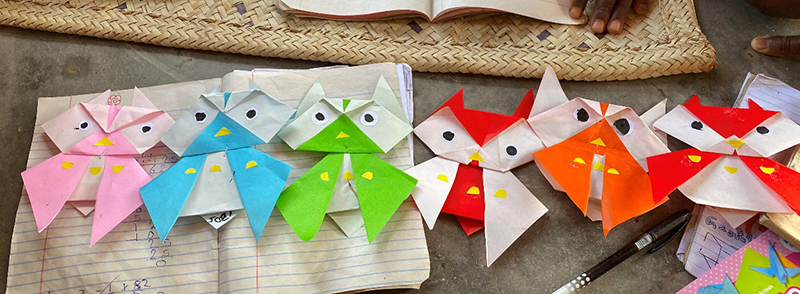Volunteer Report “Afterschool class”
2023.09.06
Name: Narumi Chida
Speciality: Primary Education
I teach mathematics at a primary school in Malawi. In this article, I introduce the 'after-school classroom'.
Every day, I have a supplementary mathematics class and a Japanese culture class called 'Afternoon Class'. In mathematics, students are required to review, prepare, and solve many practice questions to improve their exam results. Afterwards, the children will have a Japanese cultural introduction time, where they will play Japanese sports games, do origami, and cook together. I taught them some Japanese traditional dance and play. For example, Japanese dance “Soran-bushi”, tag, Japanese game “Daruma-san ga koronda” and three-legged race. Malawians who like to dance soon learnt how to dance and call out in Japanese. They also quickly learnt the tricks of the three-legged race.

In origami, children made shuriken, animals, and clothes. Most of them struggled greatly, but there were a few who were very talented. In Malawi, where there are fewer practical skills classes, athletic and artistic talents tend to be buried. That is why it is fun to observe in the after-school classrooms that "this child is not very good at studying, but he is good with his hands", or that "clever children have good concentration and listening skills, so they can do origami too".
Origami gives a feeling of achievement and I find it effective in improving concentration, listening, and seeing skills, and finger dexterity. Furthermore, we can 'learn mathematics through experience': many children over the age of 10 do not understand the difference between a triangle and a rectangle, or that one-half is half. So, I give them instructions like 'fold it into a triangle', 'fold it by 2 mm' or 'fold it by one half' and then ask them to imitate me, so they can learn mathematics terms along with the images. I feel that origami is great.

Cooking is done about once a semester and last semester we made Japanese food Okonomiyaki. Malawian children usually help their parents at home. Because of that they took the initiative to start the fire, cook, mopping and wash the dishes. I was impressed by the way they used sand to remove burnt food from the pan while saving water. They also liked the taste of the food, which is crucial. While cooking we were talking like "Measure 15g" or "15g x 3 cups is how many grams?", and I felt that this helped them to learn about mathematics.

Initially, the emphasis was on 'ensuring study time for mathematics', and Japanese culture classes were only a way of ‘inviting more children'.
However, one day, a parent of a student come to the school and told us, "My child has been coming home between 8 and 11 pm recently. She says she was studying mathematics at school...". The child is lying, as my after-school class finishes at 4.30pm. Later, a colleague who taught the child said, 'She lied to her parents and played at night'. Another teacher added: 'Teenagers are on the risk because they go out at night for entertainment, which can lead to early pregnancy and dropping out of school. I was able to go on to secondary school, but I am still ignored by my classmates who dropped out due to pregnancy".
Similar challenges exist in Japan. but it is quite difficult to prevent this in Malawi, where there is no more entertainment than in Japan.... But, many children, including the student I mentioned earlier, are studying hard every day. That's why now I feel "It would be a shame if these children ruin their own future."
So, I thought, "If they find the Japanese culture classes interesting, they will come to the after-school classes, which may help improve their academic performance in mathematics and keep them away from delinquency", so I decided to put more effort into the Japanese culture classes.
I can't say for sure that these modest actions prevented their misbehaviors, and I have no data to prove it. However, the children who come every day had a more positive approach to lessons and homework, their mathematics grades (and origami skills) improved, they helped me more, I also felt the educational benefits of origami... There were many things I learnt and gained through the afterschool classes.
I don’t have much time at here as a JOCV. I want to do my best for Malawi while exploring what I can do now until the end.
scroll